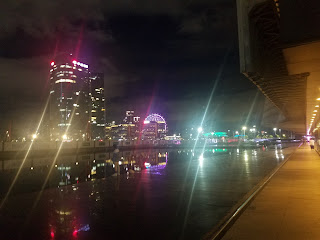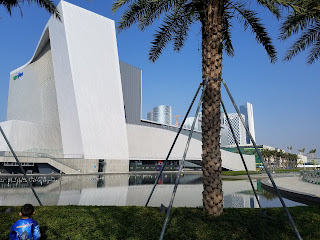I have been tardy in recording the few events that I have gone to, not that there were many before covid restrictions eased. The latest one was the most wonderful, so in reverse chronological order:
Dec 11, 2022, Longgang Cultural Center
Andrey Kudryakov Recital
Beethoven - Chopin - Schumann - Tchaikovsky
Finally, after a long drought, a concert near home (Longgang is close to a cultural desert)! This took place not in the larger hall, but in the more intimate smaller one on the fourth floor. Very nice hall!
I must say, given that I pay especially close attention to Russian musicians, I have never heard of him before. During this narrow window, there are 2 more Russian pianists playing around the city, one in the very faraway Bay Opera.
Andrey Kudryakov, a veteran and prize winner of competitions, is staff at some conservatory (I think Moscow? And I think in China too). He also judged at the 2020 Prokofiev International Competition. A little more info here in English and short interview in Chinese.
Barely into the first piece, Beethoven’s Op 31/2, “The Tempest”. I already knew I was in good hands for the evening. Here was a pianist with perfectly calibrated technique as well as sensibility! Nothing seemed forced or artificial. In this sonata relative calm is tempered by raging storms, and the pianist did not overdo anything. Then followed perfect renditions of Chopin’s Scherzo No.2 and Ballade No. 4, where again delicate moments co-exist naturally with sturm und drang passages. The pianist never played to the galleries for effect, yet he was more successful that most others more famous than him in keeping the drama unfolding. The Schumann Fantasiestucke was rich and alive, but not stretched here and there for no good reasons (hallmark of bad Schumann players).
The second half was the complete Tchaikovsky “Seasons”. Most listeners likely know a couple of them only, and I had trepidations before it started. I could never finish the cycle on my home equipment, but hearing it live is different, and the pianist was as good a messenger as one could have wished. In fact, I’d go hear him play anything, anytime.
Encore was a "concert paraphrase" of the Yellow River Concerto.
It occurred to me that, with the possible exception of Beethoven, the music played all had more elements of fantasy than structure. It’s a tribute to the pianist that while exploring all the poetry and colors on offer, he kept a tight rein and trajectory. Just marvelous!
I was sitting on an incline in the middle of the hall. The hall sound seemed to me just a little too reverberant and bass-heavy, though the pianist’s utter clarity ameliorated this to a large extent.
Come back to SZ! Come back to Longgang! You have a fan waiting!
 Aug 19, 2022, Bay Opera
Aug 19, 2022, Bay Opera
Chen Sa 陈萨and Friends
Schumann - Mozart - Mahler
I have too long neglected to record this concert (as well as the entry below). It’s been too far away in time to write in great details.
Chen Sa is a known entity and she played expertly. Equally gratifying were the 5 string players of the Youth Strings Guangzhou Symphony Orchestra, marvelous and idiomatic across the board, with a particularly luscious sound from the viola. While the Schumann Piano Quintet and Mozart Piano Concerto No. 14 (arranged by Ignaz Lachner) were both very good, the prize was the last piece, Mahler’s youthful Piano Quartet. It should be played more often, here rendered with great colors and passion.
The hall is the smaller multi-function one and had reasonable sonics. I was seated mid-row. However this concert was relayed sometime later on the internet. I streamed at home and enjoyed the sound better than in the concert hall (my equipment are good)! The vagaries of concert seating!
We need more chamber music concerts of good caliber!
Aug 13, 2022, Longgang Cultural Center
Xie Xin 谢欣
一撇一捺
Xie is one of the more famous modern dancers in China, and her company here has travelled abroad to acclaim. This was a recent work but not a new one. Techniques incorporate western and eastern elements. The dancers were all very good but I found the choreography (and lighting) a little too four square and repetitive.
It occurred to me that, with the possible exception of Beethoven, the music played all had more elements of fantasy than structure. It’s a tribute to the pianist that while exploring all the poetry and colors on offer, he kept a tight rein and trajectory. Just marvelous!
I was sitting on an incline in the middle of the hall. The hall sound seemed to me just a little too reverberant and bass-heavy, though the pianist’s utter clarity ameliorated this to a large extent.
Come back to SZ! Come back to Longgang! You have a fan waiting!
 Aug 19, 2022, Bay Opera
Aug 19, 2022, Bay OperaChen Sa 陈萨and Friends
Schumann - Mozart - Mahler
I have too long neglected to record this concert (as well as the entry below). It’s been too far away in time to write in great details.
Chen Sa is a known entity and she played expertly. Equally gratifying were the 5 string players of the Youth Strings Guangzhou Symphony Orchestra, marvelous and idiomatic across the board, with a particularly luscious sound from the viola. While the Schumann Piano Quintet and Mozart Piano Concerto No. 14 (arranged by Ignaz Lachner) were both very good, the prize was the last piece, Mahler’s youthful Piano Quartet. It should be played more often, here rendered with great colors and passion.
The hall is the smaller multi-function one and had reasonable sonics. I was seated mid-row. However this concert was relayed sometime later on the internet. I streamed at home and enjoyed the sound better than in the concert hall (my equipment are good)! The vagaries of concert seating!
We need more chamber music concerts of good caliber!
Aug 13, 2022, Longgang Cultural Center
Xie Xin 谢欣
一撇一捺
Xie is one of the more famous modern dancers in China, and her company here has travelled abroad to acclaim. This was a recent work but not a new one. Techniques incorporate western and eastern elements. The dancers were all very good but I found the choreography (and lighting) a little too four square and repetitive.






.png)
.png)
.png)
.png)
.png)
.png)




